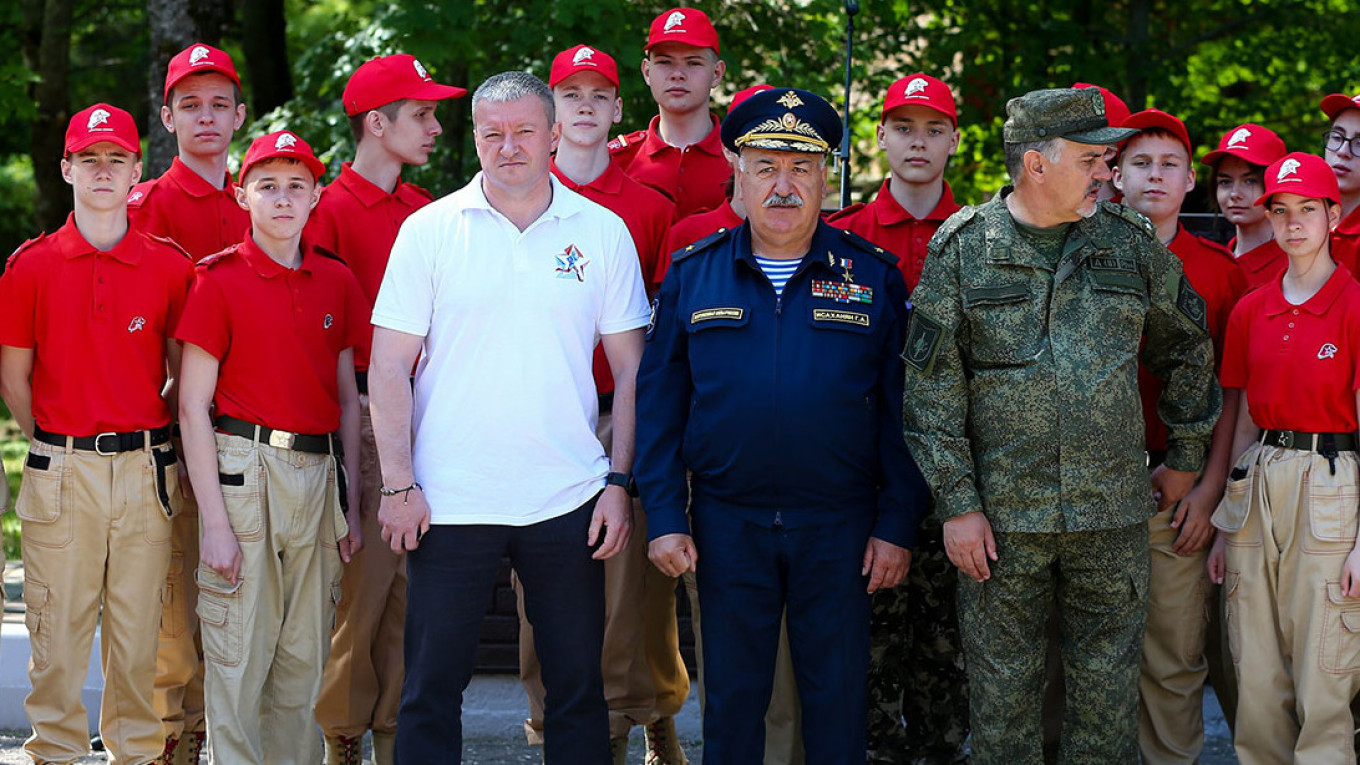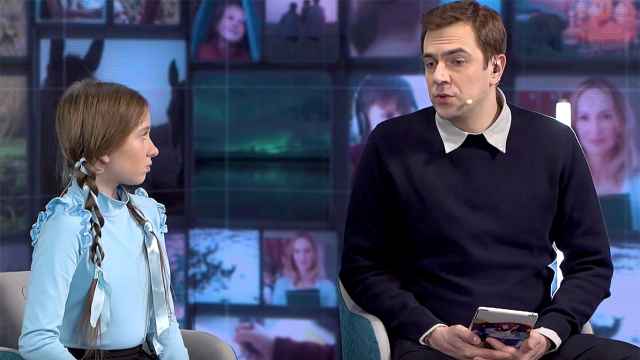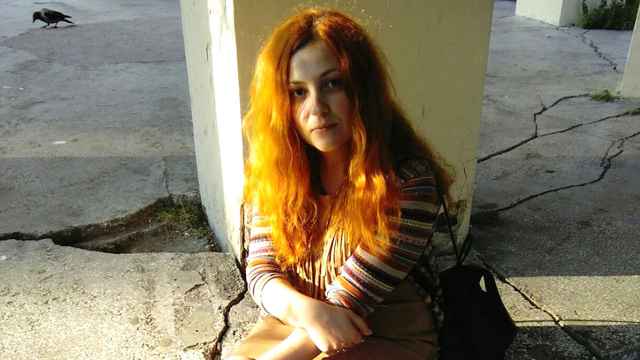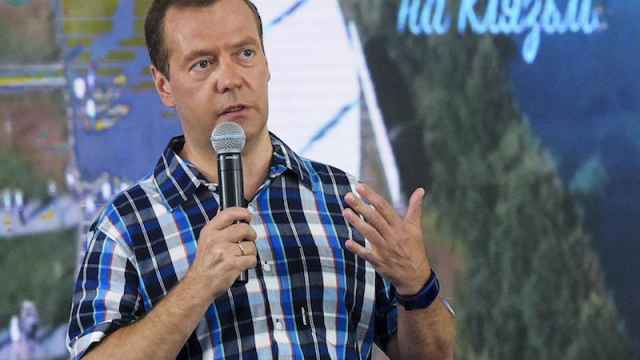In Russia, 2023 is the Year of the Teacher and Mentor. While touting the celebration as a chance to instill patriotism and acknowledge the importance of educators, in practice, the Kremlin is using it to introduce measures that undermine the influence teachers have in the classroom and prepare younger generations to continue their wars of aggression.
At the celebration’s formal launch, Russian President Vladimir Putin affirmed that the “historical mission of the Russian education system has always been to form a sense of citizenhood and patriotism.” He named the Russian Army — specifically those fighting in Ukraine — as a key beneficiary of Russia’s world-leading morality-based schooling. He hailed soldiers for battling against an enemy that seeks to destroy Russia’s historical memory, history and traditions.
Here, the takeaway may seem contradictory, but it is no less menacing: Russian soldiers lay down their lives to safeguard the value of high-quality patriotic education, and yet the highest measure of that education’s success lies in producing future soldiers who are willing to die for its defense. It is hard to escape the impression that the new curriculum is bringing up children for the purpose of death.
Putin’s vision has been formalized in the “New Philosophy of Formation” developed by the Russian Children’s Center in conjunction with Znaniye, a Soviet-era organization relaunched in 2015 to provide state-approved educational guidance and resources to the public. The new philosophy aims to unify approaches to moral and academic education, incorporating schools, families and community organizations in the process. It focuses on “improving children and young people’s capabilities” and instilling approved spiritual and moral values.
In practice, the philosophy’s most significant change relates to an increased and formal role for state-run extracurricular organizations in education. It would appear the move is aimed at peeling away at the influence teachers have on their students. This would make sense given that some teachers have resisted the state’s efforts to rein in control of the classroom. Just recently a number of school teachers in Perm resigned in protest against veteran-led war propaganda classes, while there has also been considerable backlash among educators to the introduction of a compulsory new history textbook.
Teachers’ freedom to criticize the state is likely to be curtailed under this new philosophy. Since the start of the school year, all schools across Russia have been instructed to follow an identical curriculum that is centered on fostering a sense of patriotism among students. Education Minister Sergei Kravtsov said that new advisors will work closely with teachers to ensure “historical enlightenment” that children and schools are engaging properly with the curriculum as well as state-funded patriotic organizations.
Besides patriotism, Russian children will learn practical skills that can be used if — or when — they have to go to war. For example, they will be taught how to use weapons and pilot drones.
The stark militarization of the curriculum since 2022 has signaled a dramatic shift in the government’s approach to youth patriotic initiatives. Previously the Kremlin promoted and strongly encouraged parents to send their children to patriotic, state-organised social clubs. Now it is requiring children to join up with these supposedly extracurricular activities as part of the general educational process.
In Russia, the popularity of these “spare-time schools should not be underestimated, especially as they will play an increasingly prominent role in education. After several false starts, there is now an active state-managed children’s organization — the Movement of the First — across the country. Its annual budget of 19 billion rubles ($197 million) is greater than the entire annual state budget for pharmaceutical manufacturing, even though the Movement was only established in December last year.
With the aim of shaping the worldview of 6 to 18-year-olds around “traditional Russian” values, the Movement of the First has been especially active in the newly occupied territories of Ukraine. Much of the organization’s efforts to inculcate Russian patriotism among the youth are focused on these regions. For example, the Museum of Victory holds on-site “qualification upgrade” courses for educators from the occupied territories that teach them a heavily biased version of the history of Ukrainian nationalism.
There are many patriotic programs for schools and parents to choose from — with an estimated 30,000 extracurricular organizations and clubs involved. Many of these are large-scale projects, such as Big Change, which organizes patriotic poetry competitions, events and games for young people. Back in 2022, it had close to four million participants.
A number of these initiatives were launched on the eve of Russia’s invasion in late 2021, including Little Eagles, a patriotic movement for primary-school children, and VOIN (Warrior), which organizes activities like shooting practice for young people. Despite its novelty, VOIN is now responsible for ensuring the patriotic education of children across the entirety of the Khabarovsk region, with a special focus on those nearing the age of conscription.
Another initiative, launched after the start of the war, is the Hero School forum, which advises schools on how to physically and mentally raise boys to become war heroes from as young as two years old. Organizations like these follow the Youth Army’s example by explicitly preparing children for war in a literal — rather than purely psychological — sense.
For some time, the Russian government has been preparing for a long war, even though it expected a quick victory in Ukraine. What is happening now — all under the pretense of education — is merely a continuation of this preparation, targeted at training children to admire and join the army. But it also marks a longer-term transformation of Russian society toward a constant war footing.
The sheer scale of the patriotic program is unsettling — from the intensity of its content and codification into the school curriculum, to the personal involvement of senior ministers all the way up to Putin himself But it also raises questions. If the educational system has already created so many patriots who are willing to die for their motherland, then why are these changes needed? Why do the Russian people, whom Kremlin politicians ceaselessly praise for their superior spiritual and moral values, require so much additional edification?
If the answer is that many Russians have resisted the Putinist vision of patriotism despite the enormous pressures they face, then this is cheering news. However, amid the Kremlin’s clampdown on freedom of expression, Russia’s shrinking information space, and the avalanche of patriotic initiatives listed above, people may find it increasingly difficult to remain uninterested and disengaged.
A Message from The Moscow Times:
Dear readers,
We are facing unprecedented challenges. Russia's Prosecutor General's Office has designated The Moscow Times as an "undesirable" organization, criminalizing our work and putting our staff at risk of prosecution. This follows our earlier unjust labeling as a "foreign agent."
These actions are direct attempts to silence independent journalism in Russia. The authorities claim our work "discredits the decisions of the Russian leadership." We see things differently: we strive to provide accurate, unbiased reporting on Russia.
We, the journalists of The Moscow Times, refuse to be silenced. But to continue our work, we need your help.
Your support, no matter how small, makes a world of difference. If you can, please support us monthly starting from just $2. It's quick to set up, and every contribution makes a significant impact.
By supporting The Moscow Times, you're defending open, independent journalism in the face of repression. Thank you for standing with us.
Remind me later.








